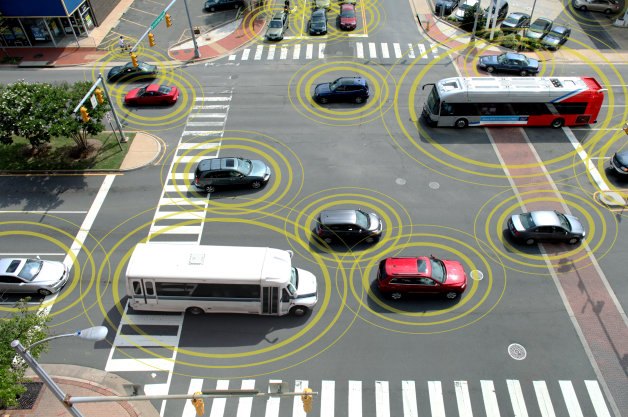FCC Prepares Repeal On Net Neutrality: Autonomous Car Victory or Orwellian Nightmare?

You’ve no doubt heard about net neutrality over the last few years. But, in case you haven’t, net neutrality is the principle that forces Internet service providers to treat all data on the Internet equally. It forbids them from discriminating on subject matter or charging different fees based upon the user, site content, website, platform, application, or method of delivery. Essentially, it makes the internet into a tap where you pay one flat fee for access to all content.
That could soon change. On Tuesday, the chairman of the Federal Communications Commission announced plans to repeal the landmark neutrality order from 2015. FCC head Ajit Pai, a Republican appointed by President Donald Trump in January, said last year that he believed net neutrality’s “days were numbered.”
Pai has been criticized for being overly supportive of telecom companies. But a few automakers support his cause, as some of the FCC’s regulations have been at odds with autonomous car development.
The planned action represents a major victory for internet service providers, including Comcast, AT&T, and Verizon. According to Reuters and Automotive News, General Motors is also a proponent of the neutrality ban. The reasoning?
“From our point of view,” GM said in a letter to the FCC, “mobile broadband being delivered to a car moving at 75 mph down a highway — or for that matter, stuck in a massive spontaneous traffic jam — is a fundamentally different phenomenon from a wired broadband connection to a consumer’s home, and merits continued consideration under distinct rules that take this into account.”
To translate, GM wants ISPs to prioritize flow to autonomous cars that may need internet access at a higher rate of speed and at a greater density. That’s a legitimate concern. As anyone who has been to a concert can attest, wireless service can slow to a crawl when everyone starts uploading videos to their phones in a small area and the possible ramifications of a connected car losing service are immense.
However, General Motors is also looking to get into the data business. And with so much money on the table, it might be handy for the company to spend more to have ISPs prioritize its content over that of its competitors. And that’s one thing that has advocates of net neutrality and a handful of companies very concerned. In July, a group representing technology firms, including Google-parent Alphabet (which includes Waymo) and Facebook Inc., urged Pai to drop his plans to rescind the rules.
The concern is that the internet will no longer be “open” without net neutrality. The scenarios posited include multi-tiered payment strategies that would force buyers into cable-like packages that end up costing more in the long run, with limited access to specific content. If a certain website is unwilling to pay more to an ISP, that provider could slow down access to the site or block it entirely. But if one paid more, ISPs could also ensure a quick and crisp connection. The point is, you don’t get to choose where you want to go online anymore or how you get there — at least not like you could before.
“The FCC will no longer be in the business of micromanaging business models and preemptively prohibiting services and applications and products that could be pro-competitive,” Pai said in an earlier interview, “We should simply set rules of the road that let companies of all kinds in every sector compete and let consumers decide who wins and loses.”
While the debate on reliable web service to autonomous cars is an important one, it’s a little worrying that those vehicles might also be so dependent upon it. It’s also unfortunate that it’s connected to business aspects that have absolutely nothing to do with automotive safety. It would be great to have reliable internet access for futuristic automobiles that need it to navigate (an issue the FCC already dealt with), but it’s a little less wonderful when the end result could be a business model that gouges you on service fees and limits the availability of specific websites.
New York Attorney General Eric Schneiderman wrote on Twitter, “The internet is the public square of the 21st century. Unless we all speak out against the @FCC’s efforts to gut the free and open internet we know today could be gone for good.” He has also claimed that his office found around 100,000 phony public comments submitted to the FCC intended to mask public opposition to Pai’s goals.
My office analyzed the public comments submitted to the @FCC about —and found that 100,000s of Americans were likely impersonated to drown out the views of real people and businesses. This was akin to identity theft on a massive scale: https://t.co/xxFjSgoqVP
— Eric Schneiderman (@AGSchneiderman) November 21, 2017
[Image: NHTSA]

A staunch consumer advocate tracking industry trends and regulation. Before joining TTAC, Matt spent a decade working for marketing and research firms based in NYC. Clients included several of the world’s largest automakers, global tire brands, and aftermarket part suppliers. Dissatisfied with the corporate world and resentful of having to wear suits everyday, he pivoted to writing about cars. Since then, that man has become an ardent supporter of the right-to-repair movement, been interviewed on the auto industry by national radio broadcasts, driven more rental cars than anyone ever should, participated in amateur rallying events, and received the requisite minimum training as sanctioned by the SCCA. Handy with a wrench, Matt grew up surrounded by Detroit auto workers and managed to get a pizza delivery job before he was legally eligible. He later found himself driving box trucks through Manhattan, guaranteeing future sympathy for actual truckers. He continues to conduct research pertaining to the automotive sector as an independent contractor and has since moved back to his native Michigan, closer to where the cars are born. A contrarian, Matt claims to prefer understeer — stating that front and all-wheel drive vehicles cater best to his driving style.
More by Matt Posky
Latest Car Reviews
Read moreLatest Product Reviews
Read moreRecent Comments
- ToolGuy If these guys opened a hotel outside Cincinnati I would go there to sleep, and to dream.
- ToolGuy Michelin's price increases mean that my relationship with them as a customer is not sustainable. 🙁
- Kwik_Shift_Pro4X I wonder if Fiat would pull off old world Italian charm full of well intentioned stereotypes.
- Chelsea I actually used to work for this guy
- SaulTigh Saw my first Cybertruck last weekend. Looked like a kit car...not an even panel to be seen.


































Comments
Join the conversation
I'm torn on the concept of net neutrality. On one hand, I like it, On the other hand, it seems like Government over-reach. Why do I deserve a right to net neutrality? that's the thing I can't pinpoint. The second thing is the negative which is similar to what happens to people needing healthcare in other countries- with no controls, there's no limits to demand. (My Mother's family is from canada, so don't give me the "thats not true" thing- there's been multiple times they've come to the US for medical needs because of their age and constraints in Canada... although I'll fully admit there's positives also) It sounds great in theory, but we're on the verge of cancelling our internet access altogether because of how expensive it is, and we've been looking at cheaper solutions like 4G and going back to dial-up. If we go back to dial up or 4G, we're essentially "back-dooring" ourselves into the negatives of non-net neutrality, unable to access many content rich sources. On the flip side, why should my 85 year old parents, who sometimes go to "google" to look up the weather and check email, be forced to subsidize the immense consumption of a teen kid next door? I fully support Net-Neutrality in any service providers bringing information to Libraries and universities for example, but I don't think I fully agree with it to your home. I have a hard time seeing "internet" as an "essential need", and therefore I have a hard time accepting that it should have guaranteed, unlimited (not in bandwidth but in content) access. There will probably be a few cases where ending net neutrality will "backfire", but there may be some areas where it doesn't. For example, single-use-providers can flourish, as can plans structured in new and unique ways, like the ultra-low-cost educational-only internet access available in parts of africa. We may face specific issues of abuse, but we may face new unique solutions that help people and save money.
Competition in the market for internet service is still somewhat limited by the physical necessity of connecting your home to the network, but even a battle between the phone company, the cable company, a satellite company, and your cell service provider does a decent job of keeping prices in check. They’re all offering more of what we want for lower prices, and they’re about to face more competition still, once wireless goes 5G. This is why a lot of tech companies are in favor of ISP regulation. The model works for them. What if, and let’s just speculate, a startup ISP was offering you a superfast dedicated connection to three of your favorite streaming sites, plus Google and email, for $15 month, and threw in free slow wireless service for your devices? You think you might take it, and just use your work connection for any other online needs? How about $5 for a no-streaming plan? I have no idea if the future lies in that direction or any other, but when we lock a system in place through regulation, we always benefit the current entrenched interests at the expense not just of their future competitors, but at the savings the rest of us might enjoy from innovation. https://spectator.org/everybody-is-wrong-about-net-neutrality/